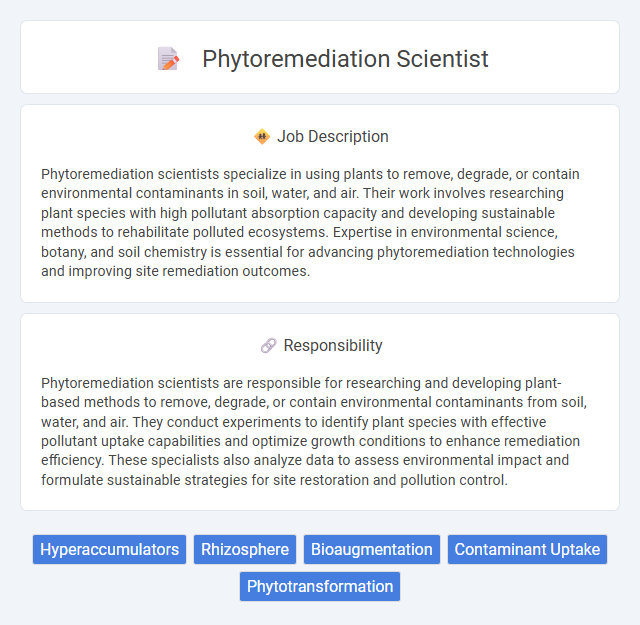
Phytoremediation scientists specialize in using plants to remove, degrade, or contain environmental contaminants in soil, water, and air. Their work involves researching plant species with high pollutant absorption capacity and developing sustainable methods to rehabilitate polluted ecosystems. Expertise in environmental science, botany, and soil chemistry is essential for advancing phytoremediation technologies and improving site remediation outcomes.
Individuals with a strong passion for environmental science and a background in biology or chemistry are likely suitable for a Phytoremediation Scientist role. Those comfortable with fieldwork, data analysis, and long-term experimental projects may find this job fulfilling and engaging. Candidates who prefer predictable office environments or fast-paced decision-making might be less compatible with the demands of this interdisciplinary research position.
Qualification
Phytoremediation Scientists typically hold advanced degrees in environmental science, botany, or bioremediation with specialized knowledge in plant biology and soil chemistry. Proficiency in molecular biology techniques, GIS mapping, and environmental risk assessment enhances their capability to design and manage contaminant removal projects using plants. Experience with regulatory compliance, analytical instrumentation, and fieldwork for monitoring pollutant levels is crucial for successful remediation outcomes.
Responsibility
Phytoremediation scientists are responsible for researching and developing plant-based methods to remove, degrade, or contain environmental contaminants from soil, water, and air. They conduct experiments to identify plant species with effective pollutant uptake capabilities and optimize growth conditions to enhance remediation efficiency. These specialists also analyze data to assess environmental impact and formulate sustainable strategies for site restoration and pollution control.
Benefit
Phytoremediation scientists likely improve environmental health by using plants to absorb, degrade, or stabilize pollutants, enhancing soil and water quality. Their work may reduce the need for costly mechanical cleanups, offering a sustainable and eco-friendly remediation method. These efforts probably contribute to restoring ecosystems and supporting biodiversity in contaminated areas.
Challenge
Phytoremediation scientists likely face the challenge of identifying plant species with the most effective pollutant absorption capabilities in diverse environmental conditions. They probably need to overcome the complexity of soil and water contamination that varies spatially and chemically, impacting treatment efficacy. Managing the long-term sustainability and ecological impacts of using plants for remediation could also present significant obstacles in research and application.
Career Advancement
Phytoremediation scientists specialize in using plants to remove contaminants from soil, water, and air, contributing to environmental restoration and sustainability. Career advancement in this field often involves progressing from research assistant roles to lead scientist or project manager positions in academia, government agencies, or environmental consulting firms. Expertise in molecular biology, environmental chemistry, and regulatory compliance enhances opportunities for senior roles and interdisciplinary collaboration in environmental innovation projects.
Key Terms
Hyperaccumulators
Phytoremediation scientists specialize in studying hyperaccumulators, plants capable of absorbing high concentrations of heavy metals and toxins from contaminated soils. Their research aims to enhance the efficiency of these plants for environmental cleanup by genetic modification and optimizing growth conditions. Expertise in hyperaccumulator species such as Alyssum murale and Pteris vittata is crucial for designing sustainable remediation strategies.
Rhizosphere
Phytoremediation scientists specializing in the rhizosphere study the interactions between plant roots and soil microorganisms to enhance the degradation of contaminants. They analyze root exudates and microbial communities that facilitate the breakdown of pollutants like heavy metals, hydrocarbons, and pesticides. Expertise in rhizosphere ecology and molecular biology techniques is essential for optimizing bioremediation strategies and improving environmental cleanup efficiency.
Bioaugmentation
Phytoremediation scientists specializing in bioaugmentation develop techniques to enhance plant-microbe interactions for efficient degradation of environmental contaminants. They study the use of specific microbial strains to promote the breakdown of pollutants in soil and water, improving the overall effectiveness of phytoremediation processes. Expertise in microbial ecology, environmental toxicology, and genetic engineering is critical for optimizing bioaugmentation strategies in field applications.
Contaminant Uptake
Phytoremediation scientists specialize in the study and application of plants to extract, degrade, or stabilize environmental contaminants such as heavy metals, pesticides, and hydrocarbons. Their research focuses on identifying plant species with high contaminant uptake capabilities and optimizing conditions for maximum absorption and transformation of pollutants. These experts often collaborate with environmental engineers to develop sustainable remediation strategies that reduce soil and water toxicity effectively.
Phytotransformation
Phytoremediation scientists specializing in phytotransformation focus on the ability of plants to metabolize and chemically alter contaminants in soil and water, effectively reducing toxicity and environmental hazards. These experts study enzymatic processes within plants that transform pollutants such as heavy metals, pesticides, and organic compounds into less harmful substances. Their research supports the development of sustainable, cost-effective bioremediation strategies, enhancing ecological restoration and environmental health.
 kuljobs.com
kuljobs.com